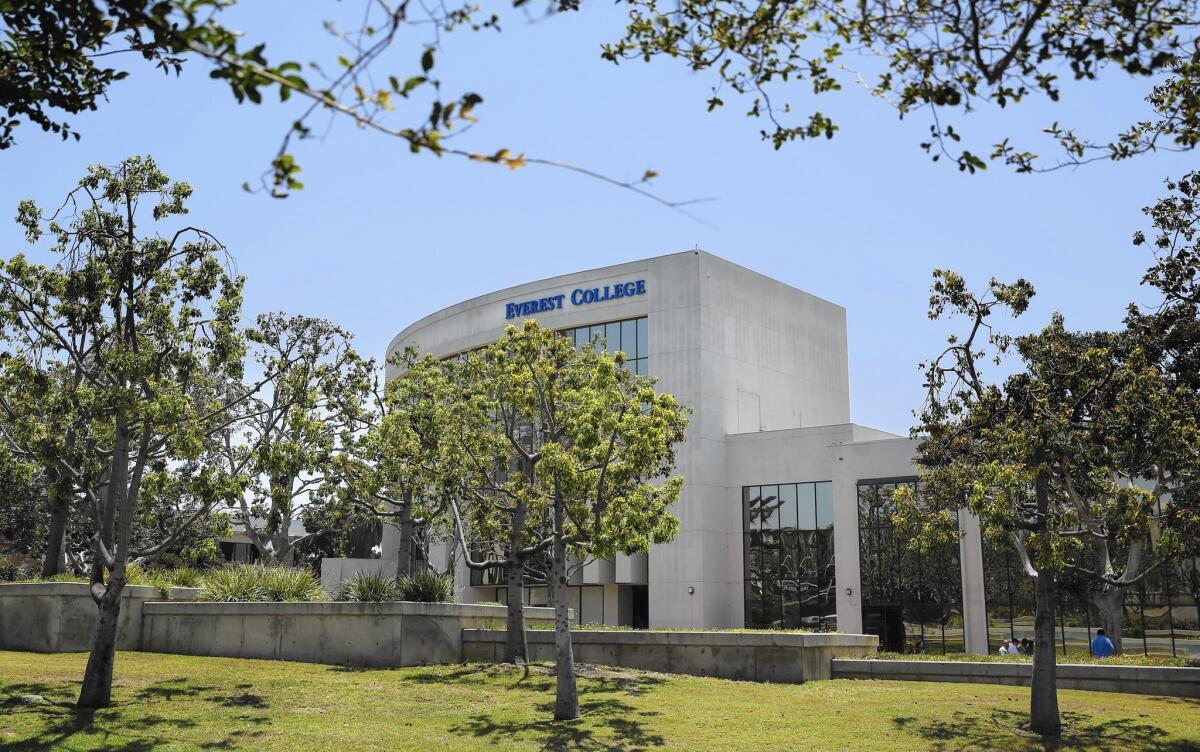Corinthian Colleges to sell 56 campuses across U.S.

After months of uncertainty about the fate of its schools, Orange County-based Corinthian Colleges Inc. announced plans to sell 56 campuses across the United States to a nonprofit entity that services student loans on behalf of the federal government.
The $24-million deal between Corinthian and ECMC Group would affect nearly 40,000 students across 17 states — the bulk of the company’s operations — but there are still lingering questions about the future of the troubled for-profit college corporation.
Corinthian has been in the cross hairs of federal and state authorities over the last year amid allegations that the company falsified student job-placement rates and misled prospective students into taking on too much debt. In June, the U.S. Department of Education temporarily suspended Corinthian’s access to federal student aid — its primary source of revenue — bringing the company to the brink of collapse.
Since then, Santa Ana-based Corinthian and the Education Department have worked to sell off or wind down most of the company’s 107 campuses and online schools.
The sale of 56 schools is the first step in that direction. But the deal does not include 13 of Corinthian’s Everest College and WyoTech campuses in California, along with 12 Heald College campuses in California and other Western states. It also operates schools in Canada that are not part of the sale.
Student advocacy groups that have long been concerned about high student loan default rates at Corinthian and other for-profit colleges were skeptical of Thursday’s deal. They said ECMC Group, based in Oakdale, Minn., has no experience running a major network of colleges, many of which serve low-income students.
“ECMC is not an education company; they’ve never granted a degree,” said Ben Miller, a former policy advisor at the Department of Education who now works at the nonprofit New America Foundation in Washington. “They’re going to have to do this all on the fly by bringing on a bunch of new people and building expertise that they don’t have.”
David Hawn, president and chief executive of ECMC Group, said the nonprofit would bring on a new management team and a different outlook from Corinthian.
He pledged that ECMC would work to reduce tuition and improve job placement at the schools, shifting the focus away from boosting revenue by maximizing student enrollment.
“It really is not about how many students we enroll, but how many students complete their programs,” Hawn said. “It’s a very, very different approach to the way career education is delivered.”
Hawn added that ECMC chose not to purchase the Everest and WyoTech schools in California because of concerns about legal liability stemming from a pending case against Corinthian by California Atty. Gen. Kamala D. Harris.
“After a number of discussions with the California attorney general’s office, we felt it was best to leave those campuses behind,” he said.
The $24-million deal for 56 campuses is a substantial discount, experts said. Just three years ago, Corinthian posted revenue of more than $1.7 billion.
Most of the money in the deal would not go to Corinthian. Of the total, $12 million would go to the Department of Education, $8.5 million would be placed in escrow to handle any outstanding liabilities and the remainder — probably less than $4 million — would go to Corinthian.
The money going to the Education Department could increase to more than $17 million over the next seven years, according to the department. A portion of the money would go toward helping students pay down private student loans offered to them by Corinthian.
Bradley Safalow of PAA Research, an investment firm that follows for-profit colleges, said the deal appeared to be aimed at blunting the effect of an eventual bankruptcy. By getting more assets off the books of Corinthian, he said, the Department of Education won’t leave all of Corinthian’s students in the lurch at once.
“Fewer students are going to wind up at an institution that no longer exists,” Safalow said. “But they’re not out of the woods. There are still tens of thousands of students who are going to be impacted negatively by this.”
The deal is contingent on approval by the Education Department and other regulatory agencies.
Education Department Undersecretary Ted Mitchell said the agency supports the sale of the Corinthian schools.
“Thousands of students can now rest assured that they will be able to pursue their education and have more stability in the midst of this school year,” Mitchell said in a statement Thursday.
But for students such as Amanda Kemp, who enrolled at one of Corinthian’s Everest College online programs in April, the deal brings only more confusion. Since Corinthian’s problems came to light in June, she has unsuccessfully waited for hours to get answers about the future of her program.
“I used to love going to school. I always wanted to jump and get my homework done,” said Kemp, 26, who lives in Tennessee.
“But since all this started happening, I wonder what I’m even doing all this for. I’ve got two children, and I’m sitting here doing homework for a degree that doesn’t matter,” she said.
ECMC is a student loan guaranty agency — a contractor that works to prevent defaults on federally backed student loans. ECMC subsidiaries handle all aspects of loan servicing: educating borrowers about ways to avoid default, collecting on defaulted loans and the more controversial practice of challenging borrowers who try to dispense student loan debt in U.S. Bankruptcy Court.
Critics have charged that ECMC has used harsh tactics in collecting debts.
Twitter: @c_kirkham







